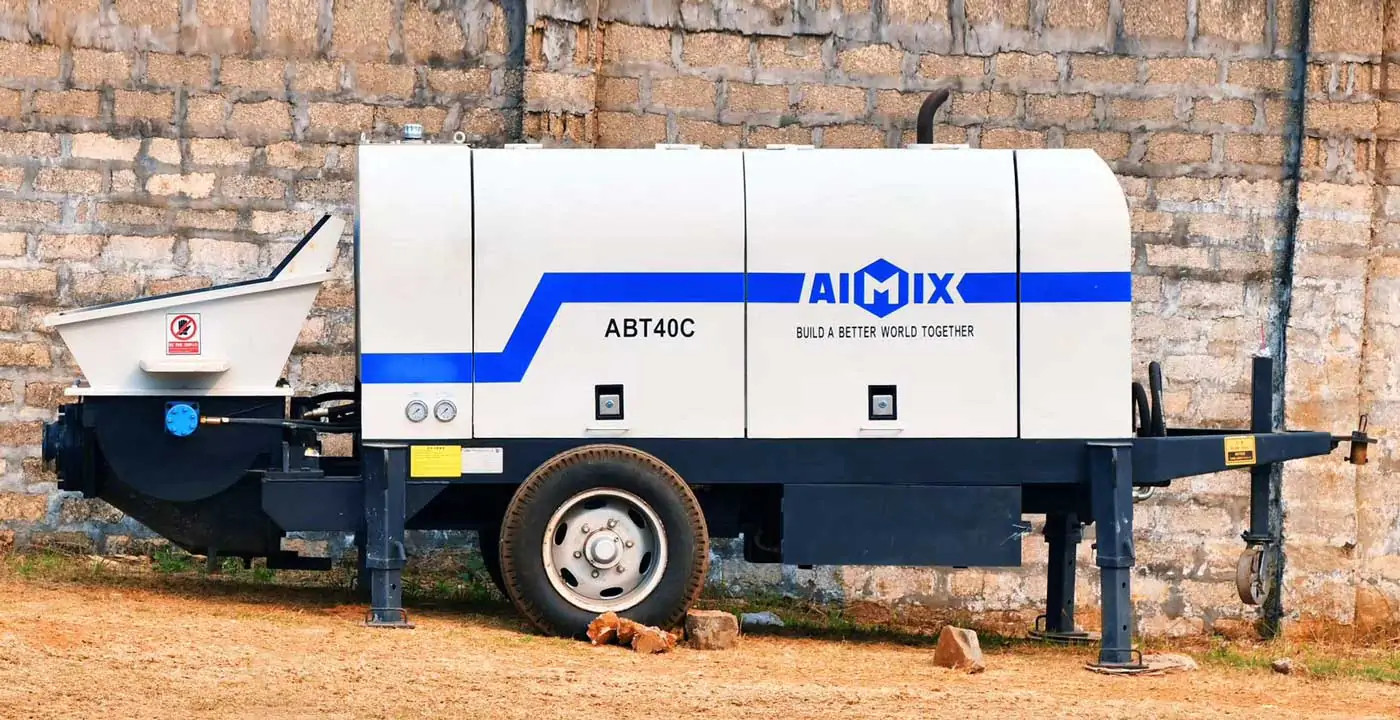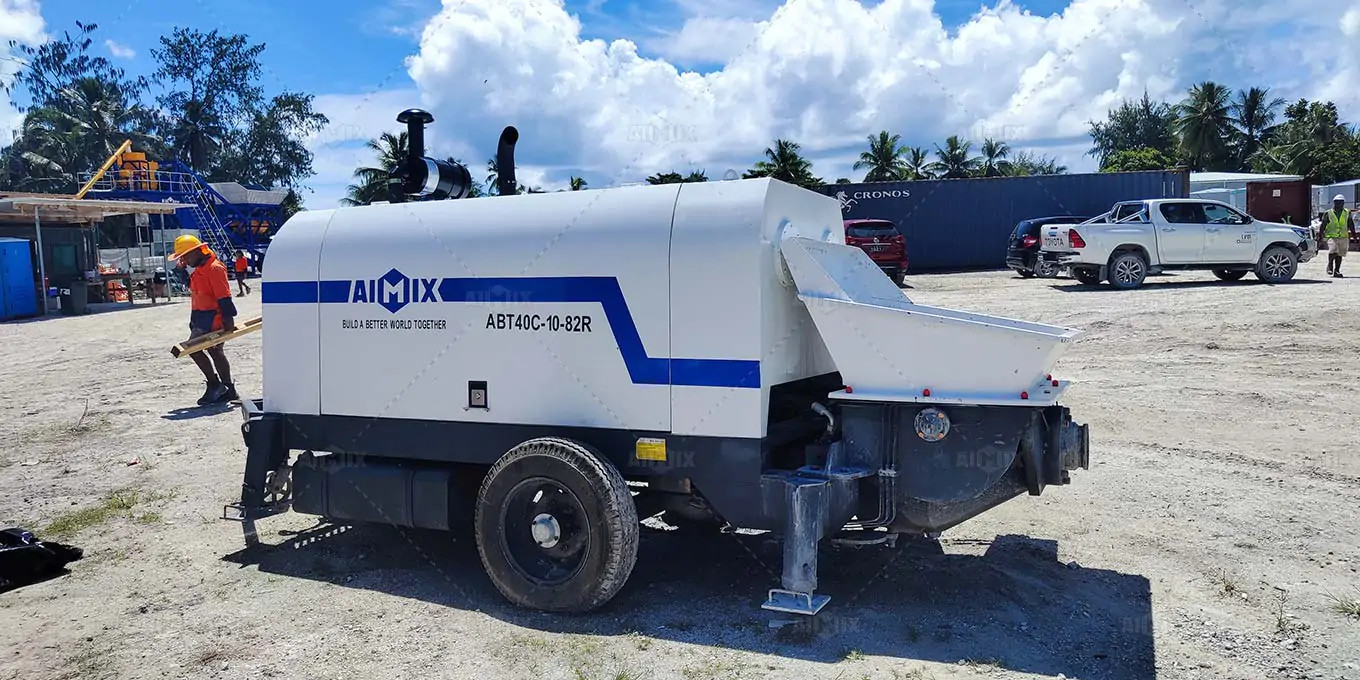What Concrete Pump Specifications Should You Pay Attention to Before Purchasing Concrete Trailer Pump for Sale
When considering the purchase of a concrete trailer pump for sale, it's essential to make an informed decision by understanding the various specifications that impact its performance, efficiency, and suitability for your specific construction needs. Concrete trailer pumps are a popular choice in the construction industry due to their portability and ability to efficiently transport concrete over long distances and through high-rise buildings. However, the selection of the right model can be overwhelming, given the wide variety of options available. This guide will walk you through the key specifications that should be considered before making a purchase.

Pump Capacity
The pump capacity is one of the most important concrete pump specifications to consider when buying a concrete trailer pump. It refers to the volume of concrete the pump can move per hour. Typically measured in cubic meters per hour (m³/h), the pump capacity determines the efficiency of the machine for a specific project. Choosing the right pump capacity depends on the scale of the construction site and the concrete volume needed.
Small Projects: For small to medium-scale projects, a pump with a lower capacity (e.g., 20–30 m³/h) will be sufficient.
Large Projects: For large-scale operations, such as high-rise construction or roadwork, you will need a pump with a higher capacity (e.g., 60–90 m³/h) to ensure efficient concrete placement.
It's essential to match the pump capacity with the volume of concrete required for the job to avoid underperformance or delays in project timelines.
Maximum Pressure and Pumping Distance
The maximum pressure and pumping distance are two specifications that directly affect the performance of the concrete pump. The pressure is the force with which the pump pushes the concrete through the pipes, while the pumping distance refers to how far the pump can effectively transport the concrete.
Maximum Pressure: The maximum pressure rating (usually measured in bar or MPa) indicates how much force the pump can exert to move concrete. Higher pressure is required for pumping concrete to greater heights or over long horizontal distances.
Pumping Distance: You should also consider the horizontal and vertical pumping distances of the pump. If you're working on a multi-story building, you will need a pump with higher pressure and vertical pumping distance to push concrete to higher levels.
For example, if you're working on a high-rise building project, you might need a trailer pump capable of pumping concrete to a height of 100 meters or more.
Hopper Capacity
The hopper capacity refers to the volume of concrete that can be loaded into the pump's hopper, from which the concrete is drawn into the pump's system. A larger hopper allows for more concrete to be loaded at once, reducing the frequency of refills and improving efficiency on the job site.
For continuous concrete placement, a larger hopper capacity is advantageous, especially for projects with high concrete output requirements. If you're working on a project with moderate to low volume needs, a smaller hopper capacity might be sufficient.
Engine Power and Fuel Type
The engine power of the concrete trailer pump is a critical specification to ensure that the pump operates efficiently and consistently. The engine's horsepower (HP) or kilowatt (kW) rating directly affects the pump's ability to move concrete and overcome any resistance encountered during pumping.
Diesel Engine: Many concrete trailer pumps are powered by diesel engines. Diesel engines are known for their power and are ideal for use in remote locations where electricity may not be readily available. Diesel engines also tend to provide higher torque, making them suitable for larger pumps that handle heavier concrete volumes.
Electric Engine: Electric-powered pumps are an excellent choice for environments where noise reduction and lower emissions are priorities. However, they may not have the same level of power as diesel pumps and may require a reliable electricity supply to function optimally.
Consider the power source that best fits your project's environmental and logistical conditions, as well as your budget.
Maximum Aggregate Size
The maximum aggregate size refers to the largest particle size in the concrete mix that the pump can handle. This specification is critical because different construction projects require different types of concrete mixtures with varying aggregate sizes.
Smaller Aggregate Sizes: If you're working with concrete that contains small aggregate sizes, such as fine aggregates and sand, a smaller pump might be sufficient.
Larger Aggregate Sizes: If your project involves heavy-duty concrete with larger aggregates (e.g., gravel or crushed stone), you will need a concrete trailer pump designed to handle such mixes without clogging or causing wear and tear.
Make sure the trailer pump you choose can handle the aggregate size typically used in your projects to avoid frequent maintenance issues.
Pumping Pressure Control System
The pumping pressure control system ensures the concrete pump operates within the optimal pressure range for the specific job. This system is essential for regulating the pump's pressure and ensuring smooth and consistent flow of concrete.
Manual Control Systems: Some trailer pumps feature manual control systems, where the operator adjusts the pressure based on their knowledge of the project requirements. While this system can offer flexibility, it requires experienced operators who can adjust the pressure correctly.
Automatic Control Systems: More modern pumps come with automatic pressure control systems that adjust the pumping pressure based on real-time conditions, such as changes in the concrete mix or distance. This feature helps prevent over-pressurization, reduces wear, and improves the pump's overall longevity.
Pump Efficiency and Fuel Consumption
Fuel efficiency is an important consideration for the operational cost of your concrete trailer pump. Whether you choose a diesel or electric-powered pump, you should assess how much fuel or electricity the pump consumes in relation to its output.
Fuel Economy: Diesel-powered pumps tend to consume more fuel under heavy loads, but newer models may come with fuel-saving features such as automatic idle control or energy-efficient engines.
Electric Pumps: While electric pumps typically consume less power than their diesel counterparts, their operational cost will be influenced by local electricity rates and the amount of time the pump is running.
Before purchasing, compare the pump's fuel or power consumption with its output to determine the overall cost-effectiveness over time.
Ease of Maintenance and Durability
A concrete trailer pump is a significant investment, so it's important to consider the long-term maintenance needs and durability of the machine. Pumps with higher-quality components and better engineering typically require less frequent maintenance and have longer lifespans.
Wear-resistant parts: Look for pumps that use durable, wear-resistant components like chrome-plated cylinders or high-quality rubber seals. These features will extend the life of the pump and reduce the frequency of repairs.
Serviceability: Choose pumps that are easy to service, with accessible parts and clear maintenance guidelines. Pumps with good service records and readily available spare parts will be easier to maintain and repair.
Trailer Specifications
The trailer specifications include the size, weight, and design of the trailer that carries the concrete pump. A good trailer should be durable and designed for easy towing and maneuvering on the construction site.
Size and Weight: Make sure the trailer is the right size and weight for your towing vehicle. If the pump is too heavy, it may be difficult to transport to different job sites.
Maneuverability: The trailer should be easy to maneuver, even in tight spaces or rough terrain. Look for pumps with adjustable axle systems or optional trailer accessories for improved handling.
Price and Warranty
Finally, you should always consider the price of the concrete trailer pump and the warranty offered by the manufacturer. While it's tempting to choose the cheapest option, always consider the long-term benefits and potential repair costs associated with lower-quality pumps.
Warranty: A good warranty is essential for peace of mind. Ensure that the warranty covers key components like the pump and engine. Manufacturers with excellent customer service and support will help you resolve issues quickly and reduce downtime.
Before purchasing a concrete trailer pump for sale, it's crucial to evaluate all the specifications to ensure that the pump meets your specific needs. From pump capacity and engine power to maintenance and durability, each specification plays a role in determining the pump's performance and suitability for your projects. By carefully considering these specifications, you can make an informed decision that will help optimize your construction operations and reduce long-term costs.
